Life after cancer- Nourishing your health
“What do I do to keep the cancer from coming back?” “What do
I eat?” “What do I not eat?” “How do I live a cancer free life/lifestyle?” These questions are ones that I hear
from my patients every day. Hippocrates said it best, “let your food be your medicine,
and your medicine, your food.” Let’s start with establishing some basic food guidelines
for cancer and chronic disease prevention.
Reduce your risk factors through diet.
Don’t get bogged down on all the different kinds of diets
that you find online. Variety is the spice of life. There is no “one diet” for everyone, however, there is a diet
that everyone can certainly avoid; the “SAD” or “Standard American/Western
Diet”. It is estimated that
dietary factors are related to 30% of all cancer development, and the SAD diet
captures them all. When eaten over time, foods high in poor quality protein,
refined sugars/carbohydrates, and bad fats (breads, processed foods, pastries,
fried foods, fast foods) can lead to the development of cancer by influencing
your genetics, environmental exposures, stress, depleted immune system, and
weight. Remember, there is one
facet that you ultimately control; your food!
Avoid these Top 5 inflammatory foods:
1) Alcohol-
Alcohol is a poison to your body and causes blood sugar imbalance. Alcohol has
a direct and linear correlation with increase risk of multiple types of cancer.
A 2011 European study of 350,000 men and women estimated about 10% and 3% of
all cancer in European men and women respectively, would be the result of
alcohol consumption. So the more alcohol you drink on a daily basis, the higher
your chances are of getting cancer.
2) Grains,
legumes/beans, and refined carbohydrates- All grains and legumes have molecules
called lectins, an inflammatory glycoprotein, that in great enough quantity,
can strip away your gut lining. These food products also increase your blood
sugar and can spike your insulin levels, leading to increased weight gain and
the risk of diabetes, heart disease, and cancer. It’s not enough to avoid all the “white foods” anymore.
3) Sugars-
Sugar is used as fuel in all of your cells, so you do need some sugar in your
body. However, too much sugar is inflammatory to your body. Over time, it can
increase your chances of diabetes and obesity- two strong risk factors for
cancer development.
4) Processed
“food”- Processed foods are high in sodium, chemical preservatives, and food
coloring, and are low in nutrient value. Skip the convenience excuse and invest
time in your health by eating whole foods as much as possible.
5) Non-organic
meat and dairy products- Non organic meats and dairy products are often
contaminated with antibiotics, pesticides, growth hormones, and unhealthy fats.
Choose cleaner, leaner options
such as bison, grass-fed beef and lamb, and wild caught fish.
Heal your gut!
The key to health starts in your gut. The unfortunate side
effect of conventional cancer treatment is the destruction of your digestive
system. The first step in any type of recovery is healing the impaired
digestive system and restoring proper function. There are many steps in this
process, however, one of the most important steps is removing foods that cause
more inflammation in an already inflamed gut. The more you reduce inflammation,
the more your body can heal and recover and the more you reduce your risk of
cancer.
Dr. Sonja Fung is a naturopathic primary care doctor with a
focus on integrative oncology at the Live Well Clinic (behind the CostPlus/
Office Depot) in La Quinta. Stay tuned for our Nutrition After Cancer program
starting in December!
References:
1. Klement, R., Kämmerer, U. “Is there a
role for carbohydrate restriction in the
treatment and
prevention of cancer?” Nutrition & Metabolism 2011, 8:75 http://www.nutritionandmetabolism.com/content/8/1/75
2. Rock, C. L., Doyle, C.,
Demark-Wahnefried, W. et al. “Nutrition and physical activity guidelines for
cancer survivors.” CA: A Cancer Journal for Clinicians, Volume 62, Issue 4, pages
242–274, July/August 2012.
3. Donaldson,
M. “Nutrition and cancer: A review of the evidence for an anti-cancer diet.”
Nutrition Journal
2004, 3:19, doi:10.1186/1475-2891-3-19 http://www.nutritionj.com/content/3/1/19
4. Freed, D. “Do
dietary lectins cause disease? The evidence is suggestive—and raises
interesting possibilities for treatment.” BMJ. 1999 April 17; 318(7190):
1023–1024.
PMCID: PMC1115436
5. Cordain L,
Toohey L, Smith MJ, Hickey MS. “Modulation of immune function by dietary
lectins in rheumatoid arthritis” Br J Nutr. 2000 Mar;83(3):207-17.
6. Alschuler, L.,
Gazella, K. Five to Thrive. El Segundo: Active Interest Media, Inc,
2011. Print.
Live Happy, Live Well.
www.livewellclinic.org. 78900 Avenue 47 Suite 102 La Quinta, CA. 760-771-5970


Comments
Post a Comment